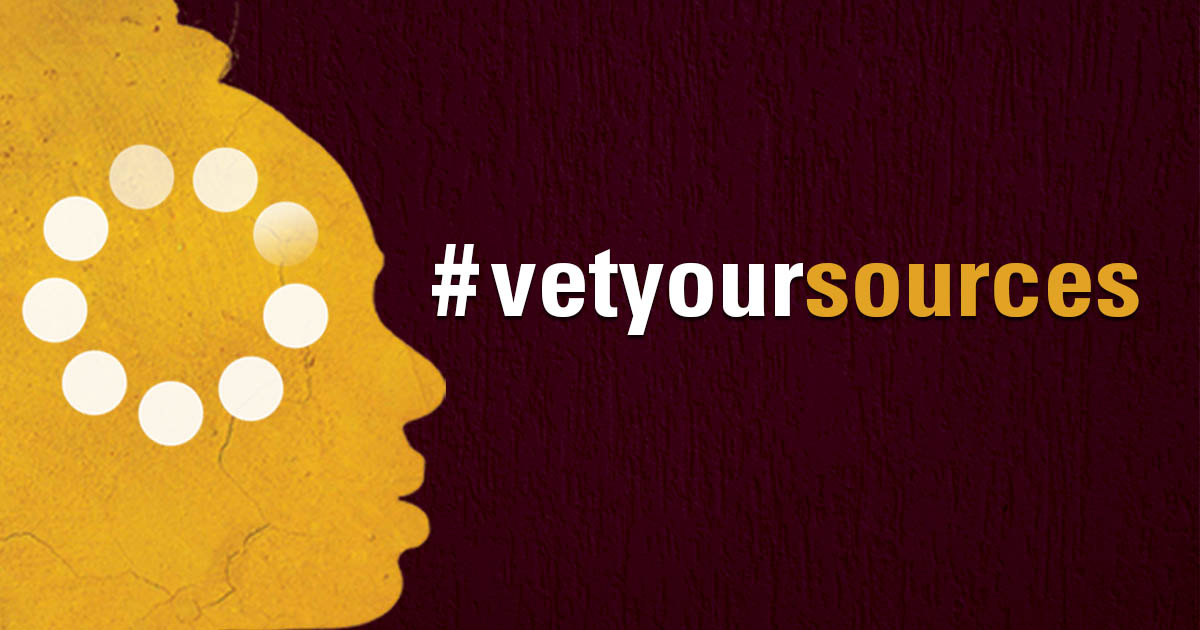As a beacon in today’s information fog, VCU Libraries launches campaign to encourage people to #VetYourSources
August 15, 2024
Into the public discourse of the 2024 election, VCU Libraries is launching an information literacy campaign to encourage all in the VCU community to carefully evaluate their sources of information — whether writing a paper, conducting research, fact-checking a speech or reading a news article in mainstream or social media.
While the public information campaign will play out largely on VCU Libraries’ social media channels Instagram, Facebook and X, one in-person element will be the October 15 Social Justice Lecture “Rumors of Theft: Navigating election integrity discourse online.”
The speaker, Mike Caulfield, is an internationally recognized expert in information literacy, and former researcher of election rumor. He is the co-author with Sam Wineburg of the book Verified: How to Think Straight, Get Duped Less and Make Better Decisions About What to Believe Online. According to Caufield:
“Election integrity is the core concern of any democracy. Citizen oversight of elections is paramount, and in healthy democracies voters share concerns about election processes, calling attention to malfeasance, raising questions about suspicious events, and calling power to account. At the same time, propagandists can flood the discourse environment with cheap, misrepresented, or fabricated evidence, making it difficult to distinguish real threats from counterfeit ones.
“In such an information fog, how do citizens make sense of their information environment? How can ordinary people distinguish between phantom concerns and issues requiring their attention?”
Caulfield has practical insights and proven tactics to identify misinformation and disinformation. In his VCU Libraries lecture, information literacy expert Mike Caulfield will detail the structure of election integrity discourse online and skills the public needs to navigate it effectively.
“We all need to be engaged in examining election discourse and integrity,” said University Librarian and Dean of Libraries Irene Herold. “Caulfield’s research-tested approach is a welcome addition to critical thinking.”
In addition to the Social Justice Lecture, related programs open to the community will include:
- A September 19 Constitution Day presentation on the history and facts underlying passage of the 26th Amendment, which made 18 the voting age. Historian Carolyn Eastman, Ph.D., and political scientist John Aughenbaugh, Ph.D., explore and explain how the 26th Amendment was born from student activism and protests in the Vietnam War era and beyond. The event will begin at 2:00pm and is open to the public.
- An Election Forum to discuss the potential foreign policies of the two major party candidates in the 2024 Presidential election will be hosted by Public Affairs Librarian Nia Rodgers and Political Science Associate Professor John Aughenbaugh, Ph.D. This event will be held on October 9 at 7:30 p.m. and is open to the public.
- In a Zine Workshop: Making Facts from Fabrications October 25 participants will explore the persuasive power of visual media by creating digital or physical collages using materials from Special Collections and Archives focused on propaganda and misinformation. Through this creative process, participants will investigate whether biased materials can ever become neutral and consider the role of visual communication in shaping narratives and sharing information.
The social media-based public information campaign will include tips from Caufield’s book as well as information from librarians and other reliable sources.
“This information campaign is all about sharing materials and knowledge VCU Libraries already provides to support our students and faculty inside and outside the classroom,” said Sue Robinson, director of communications and public relations for VCU Libraries. “The information we will share is neutral, not partisan, political or biased. Knowledge management, information vetting, evaluation of sources, finding truths and checking facts are core skills of librarians. They are experts at this and we can trust them.”
“One of the most important things libraries do is empower people to find, evaluate and use the information they need,” says Laura W. Gariepy, associate university librarian for research and teaching. “Empowering students to assess the quality of information they encounter is a core tenet of academic librarianship.
“Although this is important all the time, it’s an issue that’s very much in the spotlight during elections. We want to put useful advice out there while people are exceptionally interested in advancing their own skills in evaluating information.”
The #VetYourSources campaign will launch in September with a week-long stream of posts on VCU Libraries’ Instagram, Facebook and X accounts. The stream of tips and ideas for students evaluating information in their academic and everyday lives will include evaluation of news sources.
The campaign will focus on empowering people to think about the information they consume—to embrace a healthy skepticism, ask questions and seek answers.
“We know from working with our students at VCU what a challenge it can be to feel confident in evaluating social media, news, and websites,” Gariepy said. “The information landscape has become incredibly complex and voluminous. Particularly when it comes to highly charged issues, it’s easy for all of us to let key signs of the quality and accuracy of information we’re consuming slip by.”
Respected national studies show that even though young people are fluent in social media, they are not equally perceptive about what they see on social media. A landmark Stanford University study, authored by Sam Wineburg–the co-author of Verified–found that young and otherwise digitally savvy students have difficulty judging the credibility of online content.
“This semester, like every semester, librarians will work with students in the classroom and one-on-one to sharpen their skills in evaluating all types of information,” Gariepy said. “That ranges from being able to identify a peer-reviewed article to seeing signs of exaggeration, misinformation or biased language in our news.”
Much of the content shared in #VetYourSources is freely available in online guides prepared by VCU’s librarians. People can explore these resources, which point people in trusted directions to explore truth and check facts.
- go.vcu.edu/factcheck
- go.vcu.edu/media
- go.vcu.edu/checkstats
- go.vcu.edu/thesource
- https://guides.library.vcu.edu/ai
< Previous Next >
 Chat
Chat